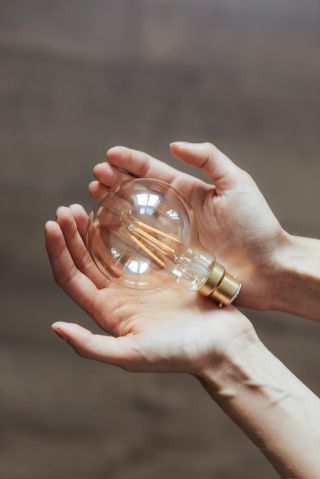Creativity
3 Steps to Strengthen Creativity and Personal Effectiveness
Is it time to stop procrastinating and finally get going on that project?
Posted January 4, 2023 Reviewed by Davia Sills
Key points
- Openness to new experience is strongly linked to creativity.
- Creativity is one of the 24 character strengths common to humankind.
- Adults and kids can cultivate inventiveness and self-expression, particularly everyday creativity.

Maybe it’s time to stop procrastinating about your creative desires. Beginning a new creative habit can strengthen your personal effectiveness and may be easier than you think.
Creativity involves openness to new experiences. This is not about creative genius. Rather, it’s about welcoming creativity into your everyday life on a regular basis. Invite yourself to explore the realm of not knowing and then notice what happens.
The terms everyday creativity or small-c creativity are used to describe originality and openness to new experiences in daily life (Richards, 2021). We all have the capacity to create, whether we are renowned artists or regular folks just wanting to try our hand at something new.
Take me, for example. During the pandemic, I had some extra time and a bit of motivation. So, like many others, I tried my hand at baking bread, something I’d always thought about but had never done. The process was filled with sticky hands, joyful moments, and meaningful creativity. However, after a few tries, I stopped baking.
During the year prior to the COVID-19 pandemic, I had started writing a book, which was nowhere near completion. With the much quieter lifestyle, I decided to double down on writing, promising myself that I would write something every day for at least 10 minutes, regardless of the quality. Now, a couple of years later, I’m proud to share that I’ve completed writing that book about finding new beginnings after age 50—and am seeking a publisher.
Here are some ways to get in touch with your own creative side.
1. Leverage your character strengths to foster your new creative habits.
Character strengths are your capacities for thinking, being, feeling, and behaving. Psychologists have identified 24 common character strengths; creativity is just one of them. These strengths are present in people across all cultures, and they are measurable (Niemiec, 2013). Thus, we all have these strengths, although for each individual, our top strengths can vary.
And here’s some good news: We can develop and grow our strengths. In the examples shared above, my new creative habits were bolstered by engaging my character strengths of love of learning, curiosity, and perseverance. Thanks to these strengths, my potential and creativity have increased.
2. Empower your creativity habit with mindfulness.
Trying something new or different and paying mindful attention while you are doing it can help to boost creativity. Research evidence has associated mindfulness with benefits including task focus, concentration, compassion, and self-regulation (Goleman & Davidson, 2017). These mindful positives are important assets for creativity.
There are many simple mindfulness practices. Here are just a few:
- Pause during the day to notice that moment as it is.
- Focus on the flow of your breath as you inhale and exhale.
- When you’re doing something you enjoy, simply pay attention and mindfully notice you’re doing it.
- Try a mindfulness practice on an app on your electronic device, in a podcast, or in a book about mindfulness.
3. Welcome creative habits into your everyday life.
Creativity invites you to open and expand to new experiences. Allow yourself to recognize that creativity happens in different ways with varying modes of expression. What if you experimented with less rigidity and greater openness and creative expression in your everyday life? What if you accommodated to personal or professional change with greater flexibility, seeing things in new ways? What if you tried to solve problems more creatively, seeking novel, effective outcomes?
Kids are naturally creative. Similarly, adults can also nurture and cultivate our inventiveness and self-expression, particularly our everyday creativity. Regardless of life’s external events, we can experiment with our daily experiences and actions. Creative awakening need not be about any product, but simply the intention and process of opening to new or unexpected encounters in alternative ways. Creative awakening calls on us to reduce judgement and rigidity—embracing what the Buddhists call the beginner's mind.
Invite yourself to explore the realm of not knowing and then notice what happens. According to Scott Barry Kaufman, scientific director of the Imagination Institute in the Positive Psychology Center at UPenn (2020), openness to experience—both inner and outer—is a strong predictor of creative achievement.
Here are a few pathways to creative habits:
- Travel to a new location or to an old one via a different route or mode of transportation.
- Write a song or rhyme.
- At work or at home, try an everyday task in an alternate way or with your non-dominant hand.
- Do a wood project or fix something that’s broken.
- After you listen to a podcast or read an article, write down some of your reactions or create a simple poem.
- Re-arrange some items in your home.
- Play a game that encourages you to think creatively.
- Learn more about something you’re interested in or try a new activity.
- Seek a creative solution to an everyday problem and give it a try.
- Play with a child or talk with a teenager in your life.
- Sing in the car or the shower.
- Have fun working on your dance moves.
- Attend a concert, show, or play, on site or virtually.
- Grow a few plants in your window or start a small garden.
- Learn a musical instrument or try drumming.
Copyright © 2022 Ilene Berns-Zare, LLC, All Rights Reserved.
This article was also published here.
Disclaimer: This article is for informational purposes only. No content is a substitute for consulting with a qualified mental health or healthcare professional.
References
Goleman, D. & Davidson, R.J. (2017). Altered traits: Science reveals how meditation changes your mind, brain, and body. New York, NY: Penguin Random House.
Kaufman, S.B. (2020). Transcend: The new science of self-actualization. New York, NY: TarcherPerigree Books.
Niemiec, R. (2014). Mindfulness and character strengths: A practical guide to flourishing. Boston, MA: Hogrefe Publishing.
Richards, R. (2010). Everyday creativity: Process and way of life—Four key issues. In J. C. Kaufman & R. J. Sternberg (Eds.), The Cambridge handbook of creativity (pp. 189–215). Cambridge University Press. https://doi.org/10.1017/CBO9780511763205.013




